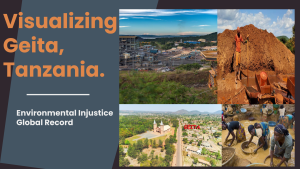Visualizing Geita
xxxx

xxxx

The stakeholders in the film would be the doctors, the local health ministry, and the patients themselves. The doctors were the most focused on, and they were put into a lot of situations in which they were the sole decision makers. However, many times the decisions weren't life or death, but death or comfort. For instance, Davinder was in a situation where a child was inexplicably swelling all over his body. The doctors weren't well equipped for diagnosing his illness, and thus the child was doomed to worsen and die. A nurse informed him that the mother had taken the child and left, to which Davinder remarked that he couldn't blame them. He believed the comfort of the child in somewhere without his care was worth just as much as, if not more than, his care in the hospital. This was quite different than Kiara's opinion that they needed to stay in the hospital. She blamed it on a lack of confidence in medical ability, while he saw it as being human.
Following the time on the mission, the doctors all had to decide what was next. Dr. Brasher left MSF to practice medicine in Paris, while Dr. Gill went to Australia to become a pediatrician, with no plans of returning to MSF. Dr. Lapora was promoted to Emergency Coordinator, and established three more missions in other parts of the world. Dr. Krueger still works with MSF and has been on a number of other missions. All of the doctors continued medicine, but their experiences in Liberia dictated their plans on whether to continue this service.
The author, Didier Fassin, is a French anthropologist and sociologist with training in medicine and public health. He has worked in the field of medical anthropology for decades through research and field experience. He currently works as a professor of social science at the Institute for Advanced Study in Princeton.
The data presented could be used for medical professionals to better understand the cause of similar symptoms, or to treat patients involved in a similar incidents. The methods of research presented could be used by academics and researchers in further study.
The author references this article in a number of his other works.
The system has partners including UNAIDS, a branch of UNISEF, International Medical Corps, Medecins Du Monde, AAHI, and other humanitarian organizations. The support of these groups both financially and with the user community is important to maintain the app as an active site for research and development. The technical aspects of the site also heavily rely on the data storage method, which is not mentioned but would require massive amounts of memory as well as safeguards to prevent data loss on the app servers.
The most persuasive part of the film was when the palliative care doctor discussed the importance of understanding a patients goals. Everyone has different priorities and will make decisions on their treatment based on those priorities. The ideas presented in the film that deal with the point where treatment is no longer the best course of action are more widely accepted now but still challenge doctors whose entire professions focus on saving lives.
THe bibilography is made up mostly of other research articles and studies, suggesting this paper is more technical in nature than discussive. There is little to no opinion given, rather hard facts and statistics.
Different sections of the policy applies to different groups, the first section focused on disaster preparedness which was directed at state and city governments. The subsequent sections apply to various organizations and government groups that would be working under an interagency task force in the case of an emergency, and the individuals that would be requesting aid or funding after a disaster.
Artisanal or Snall Scale Mining in Geita.